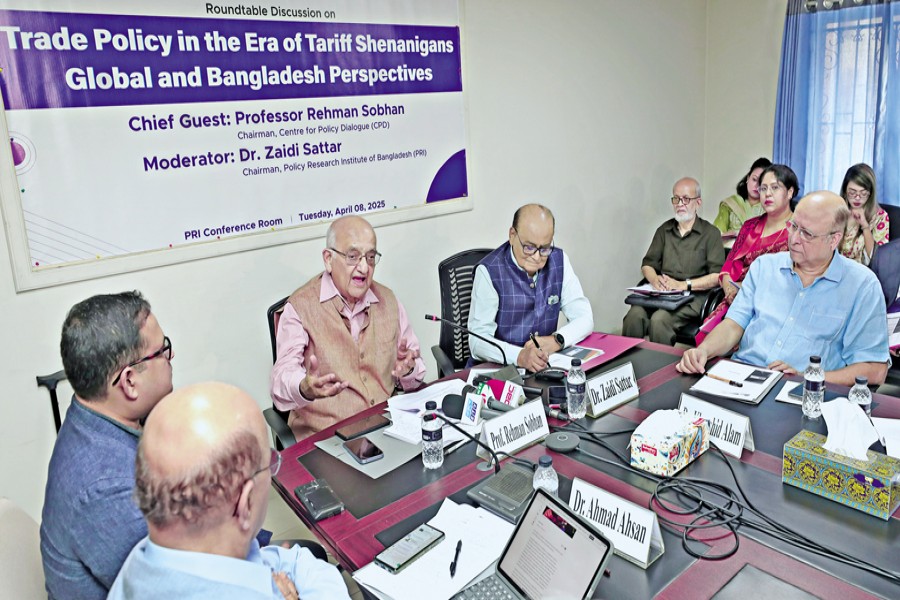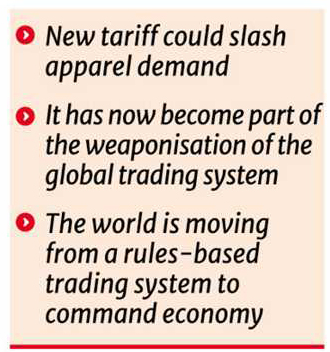
Published :
Updated :

Bangladesh should shift its export focus to the Asian markets-especially China and India-to grab duty-free benefits and offset the risk of possible decline in exports due to the new US tariff regime rather than being overdependent on the US market, economists said.
They also called for composed diplomacy suggesting that Bangladesh should engage with US counterparts swiftly and smartly not just to protect its export sectors but also to position itself as a stable and rational trade partner during a time of global flux.
They further stressed the need for addressing USTR concerns by rationalizing high tariffs on US goods such as automobiles and alcoholic beverage and reducing non-tariff barriers (NTBs) through improvements in intellectual property rights, regulatory bottlenecks and anti-corruption measures.
Their observations and suggestions came at a roundtable discussion titled 'Trade Policy in the Era of Tariff Shenanigans: Global and Bangladesh Perspectives' organised by Policy Research Institute of Bangladesh (PRI) in the city on Tuesday.
Economists and exporters noted that the country enjoys a trade surplus of more than $6 billion with the USA and a portion of the export could be affected if Bangladeshi exports face higher tariffs there.
Speaking as the chief guest, eminent economist Professor Rehman Sobhan, also chairman of Centre for Policy Dialogue (CPD), said an overreliance on the US market could be detrimental.

"The country's future lies in Asia and our goal should be to look at the East and neighbours where we get duty-free access. China and India could be the key markets," Mr Sobhan said. He suggested that exporters should explore how much of the $6 billion trade flow could be redirected to China and India and added that businesses must take responsibility for seizing these opportunities.
Citing China as the biggest source of capital and services in Asia, he said Bangladesh should seek investment from regional players rather than depending on the US. He, however, laid stress on strategic moves that could still attract American investors to Bangladesh.
"The US is reverting to the 19th-century period of import substitution, creating a rule-bound globalization with the weaponization of economic instruments". The US that started globalization is now throwing away the system, he said, adding that Bangladesh and others will have to survive in this reality. "Now it is no longer survival of the fittest, rather those who can negotiate or make the best agreements will survive."
The way US President Donald Trump is trying to deal with the bilateral trade deficit is unprecedented in the history of the world and through this, he has thrown away the market economy and it is unlikely to yield the intended results, said Mr Sobhan.
The world is moving from a rules-based trading system to command economy of the Stalin era again, he said, adding that economic challenges are no longer being addressed through established economic principles, but rather through other considerations.
Tariff issue can't be looked at a narrow context, as it is part of the global changes, he said. "Tariffs have now become part of the weaponization of the global trading system, and we are caught in this process."
Bangladesh's proposal to increase exports as a means of avoiding the impact of high tariffs is not consistent with the principles of the market economy, he said, adding that US cotton enjoys zero facility and asked whether cotton import from the US could be increased.
Bangladesh manufactures garments based on different designs, prices and market demands and so it is not possible to produce all garments using US cotton, he said.
"The new US tariff regime marks a frontal attack on the rules-based global trade order and will reshape the landscape of international commerce if it prevails," PRI Chairman Dr Zaidi Sattar said while presenting his keynote paper. "This is a sledgehammer unleashed on a glass house."
Key rivals like Vietnam, India and Cambodia have already begun engaging with US and urged the policymakers to take proactive responses, he noted. He suggested avoiding retaliation saying it could be self-defeating and legally problematic.
His other recommendations included reforming the import regime, lowering tariffs on US machinery, agricultural goods and semiconductors that have minimal revenue impact.
He suggested diversifying both market and products along with reducing anti-export barriers and supporting non-RMG sectors like footwear.
His also called for reviewing tariffs on US goods such as automobiles and alcoholic beverages, and strengthening regulations to address non-tariff barriers, including better enforcement of intellectual property rights and anti-corruption measures.
Selim Raihan, Executive Director of South Asian Network on Economic Modelling, said "The US has not only targeted tariffs, its development aid has also been downsized. Bilateral trade will depend on the bargaining power of nations".
The tariff measures could disrupt international trade order, he said, adding that tariff reform is necessary but not sufficient. He requested the policymakers to focus on bilateral dialogue to absorb the shock.
Speaking virtually, Dr MA Razzaque, chairman of Research and Policy Integration for Development, said, "Unfair and unequal negotiations can lead to welfare loss instead of utilizing trade as a measure of growth."
He explained that due to the new US tariff regime, average tariffs on RMG produced in China, Vietnam, Bangladesh and Cambodia would rise by 40 per cent resulting in a price hike of 10 per cent and apparel import demand would fall by 32 per cent.
The US market could contract significantly and if China is restricted from the US market, it would start focusing more on EU and Japanese markets pushing the prices of garments to fall further globally.
CPD distinguished fellow Professor Mustafizur Rahman said WTO dispute settlement system has long been dysfunctional and the complaints lodged by China and Japan to the WTO in response to the new US tariffs are unlikely to yield results. He suggested holding bilateral discussion with the US.
Anwarl ul Alam Chowdhury, president of Bangladesh Chamber of Industries, said employment would be affected if exports face difficulties. He said the shock comes at a time when the country is scheduled to graduate from LDC status.
Munni_fe@yahoo.com


 For all latest news, follow The Financial Express Google News channel.
For all latest news, follow The Financial Express Google News channel.